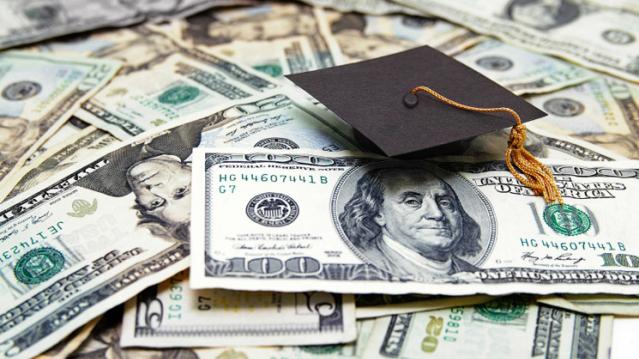College Students Say They’re Good with Money. Do You Believe Them?

A new study confirms it: College students think they know everything, at least when it comes to personal finance.
Nearly 60 percent of college students said that they had good or excellent financial literacy skills, according to a study released today by the American Institute of CPAs.
Despite that confidence, less than half of students say they stick to a monthly budget, nearly 40 percent had borrowed money from friends or family and more than 10 percent had missed a bill payment.
Of those surveyed, 99 percent said that personal financial management skills were important, but only a quarter said they seek out information on personal finance and incorporate it into their spending and saving habits.
“For many students, college is their first time making financial decisions,” Ernie Almonte, chairman of the AICPA’s Financial Literacy Commission said in a statement. “With this opportunity comes serious responsibility, and if they aren’t making informed, intelligent decisions it can have a negative impact on the rest of their financial lives.”
College students without a strong foundation in personal finance are more likely to take on risky debt or make poor saving decisions. But most students aren’t getting the education they need before they get to campus.
Just 17 states require high school students take a personal finance course, and only six require testing of personal finance concepts, according to the Council for Economic Education. Three out of four American teens can’t even make sense of a paystub.
But hey, at least they’re confident.
Top Reads from The Fiscal Times:
- House GOP Scores a Major Win in Obamacare Legal Challenge
- Hillary’s E-Mail Lapse ... Mistake ... Responsibility ... er, 'Apology'
- How Can You Tell There Are Russian Troops in Syria? Just Look for Some Soldier Selfies
Marco Rubio Says There’s No Proof Tax Cuts Are Helping American Workers

Sen. Marco Rubio (R-FL) told The Economist that his party’s defense of the massive tax cuts passed last year may be off base: “There is still a lot of thinking on the right that if big corporations are happy, they’re going to take the money they’re saving and reinvest it in American workers,” Rubio said. “In fact they bought back shares, a few gave out bonuses; there’s no evidence whatsoever that the money’s been massively poured back into the American worker.”
For Richer or Poorer: An Updated Marriage Bonus and Penalty Calculator

The Tax Policy Center has updated its Marriage Bonus and Penalty Calculator for 2018, including the new GOP-passed tax law. The tool lets users calculate the difference in income taxes a couple would owe if filing as married or separately. “Most couples will pay lower income taxes after they are married than they would as two separate taxpayers (a marriage bonus), but some will pay a marriage penalty," TPC’s Daniel Berger writes. “Typically, couples with similar incomes will be hit with a penalty while those where one spouse earns significantly more than the other will almost always get a bonus for walking down the aisle.”
Trump Administration Wants to Raise the Rent

Housing and Urban Development Secretary Ben Carson will propose increasing the rent obligation for low-income households receiving federal housing subsidies, as well as creating new work requirements for subsidy recipients. Some details via The Washington Post: “Currently, tenants generally pay 30 percent of their adjusted income toward rent or a public housing agency minimum rent not to exceed $50. The administration’s legislative proposal sets the family monthly rent contribution at 35 percent of gross income or 35 percent of their earnings by working 15 hours a week at the federal minimum wage -- or approximately $150 a month, three times higher than the current minimum.” (The Washington Post)
New Push for Capital Gains Tax Cut

Anti-tax activists in Washington are renewing their pressure on lawmakers to pass new legislation indexing capital gains taxes to inflation. The Hill provided an example of such indexing that Grover Norquist recently sent to Treasury Secretary Steven Mnuchin: “Under current policy, someone who made an investment of $1,000 in 2000 and sold it for $2,000 in 2017 would pay capital gains taxes on the $1,000 difference. But if capital gains were indexed, the investor would only pay taxes on $579, since $1,000 in 2000 would be equivalent to $1,421 in 2017 after adjusting for inflation.” Proponents of indexing say it’s just a matter of fairness, but critics claim that it would be just another regressive tax cut for the wealthy. Indexing would cost an estimated $10 billion a year in lost revenues. (The Hill)
Bernie Sanders to Propose Plan Guaranteeing a Job for Every American

Sen. Bernie Sanders (I-VT) is preparing to announce a plan for the federal government to guarantee a job paying $15 an hour and providing health-care benefits to every American “who wants one or needs one.” The jobs would be on government projects in areas such as infrastructure, care giving, the environment and education. The proposal is still being crafted, and Sanders’ representative said his office had not yet come up with a cost estimate or funding plan. Sen. Kirsten Gillibrand (D-NY) last week tweeted support for a federal jobs guarantee, but Republicans have long opposed such proposals, saying they would cost too much. (Washington Post)
